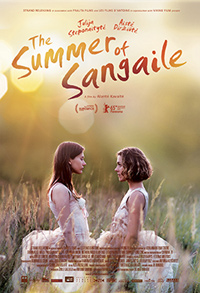The Wind Beneath Her Wings: Kavaite’s Sapphic Sophomore Sighs
 Sophomore is an adjective that serves as a pun to describe Alante Kavaite’s latest film, The Summer of Sangaile, a coming of age tale concerning a young woman that discovers herself over the course of one very important summer. However, a similar interest in her woes isn’t extended to the audience. Though featuring a handful of sexual encounters, Kavaite’s film seems to be dabbling in the homoerotic tendencies of its protagonist, an emotionally troubled youth with little drive to pursue her greatest dreams. But beat by strained beat, there’s nothing innovative or subtle in this adolescent’s journey to spreading her wings and, literally, flying high.
Sophomore is an adjective that serves as a pun to describe Alante Kavaite’s latest film, The Summer of Sangaile, a coming of age tale concerning a young woman that discovers herself over the course of one very important summer. However, a similar interest in her woes isn’t extended to the audience. Though featuring a handful of sexual encounters, Kavaite’s film seems to be dabbling in the homoerotic tendencies of its protagonist, an emotionally troubled youth with little drive to pursue her greatest dreams. But beat by strained beat, there’s nothing innovative or subtle in this adolescent’s journey to spreading her wings and, literally, flying high.
In rural Lithuania, 17 year old Sangaile (Julija Steponaityte) meets the audacious Auste (Aiste Dirziute) at a local air show where a stunt pilot shows off fancy tricks. It’s obvious that Sangaile is fascinated with the planes, and Auste is equally entranced by Sangaile, fixing a drawing so that Sangaile wins a ride on the plane. However, Sangaile rebuffs the opportunity, though Auste gaily calls out to Sangaile her place of work so she can track her down at a local coffee shop. Sangaile visits, strikes a quick rapport with Auste, and goes off swimming with Auste’s crew. Back at home in her parents’ ornate home, we see that Sangaile is a conflicted young woman, at odds with her overbearing mother and cutting herself to escape the pain of life’s disappointments. But the effervescent Auste teaches Sangaile a few things about herself, which allows Sangaile to discover her capabilities.
Due to be compared, and unfairly so, to the superior 2013 title Blue is the Warmest Color (and for those detractors of that film so uncomfortable with its brazen sexuality, consider its ability to inspire divisive reaction, whereas Kavaite’s rendering of sensual pleasures seems rote) solely for its superficial focus on a budding lesbian romance, Kavaite films feels more along the lines with Pawel Pawlikowski’s 2004 film, My Summer of Love, which featured an affair that ended a bit more dramatically. Both those features were directed by men, a detail often centered at detractors of both those films. While Kavait may strike less controversy, the film unfortunately lacks resonance, numbingly relayed with stringent familiarity.
As a psychological portrait of a young woman lost in a cold world wherein she cannot seem to relate to anything or anyone, Sangaile, as played by Julija Steponaityte, is a striking screen presence, sometimes resembling a waifish Lea Seydoux. But behind her opaque gaze, we simply get fed details about her emotional torpor, which has resulted in a habit of cutting. Auste is meant to be her opposite, a carefree artsy type who wears too many accessories and can’t seem to edit anything else in her life. In one telling scene, Auste, dressed as a flour caked geisha, inquires of the woman cooking in the kitchen next to her, “Why do you put salt and sugar?” It’s one of several obvious instances meant to highlight their disparity, and why Sangaile (whose name means ‘strength’) needs a figure like Auste, someone who will help her through a threshold of male and female, stupor and action.
Unfortunately, we never get much sense of Auste, played by Aiste Dirziute who looks an awful lot like up and coming German actress Henriette Confurius. This lack of characterization is highlighted in one highly emotive scene from Sangaile’s estranged, and unpleasant mother, whose nostalgic tears over her past glory as a ballet dancer reflect in one instance a kind of power that is lacking in the rest of the film. More extravagant is Dominique Colin’s (Noe’s I Stand Alone) resplendent shots of the Lithuanian countryside, continual aerial shots used to convey the sense of Sangaile’s expanding horizons, a motif unnecessarily repeated with budding flowers on the cusp of bloom.
Reviewed at the 2015 Sundance Film Festival – World Dramatic Competition. 88 Mins.
★★/☆☆☆☆☆


